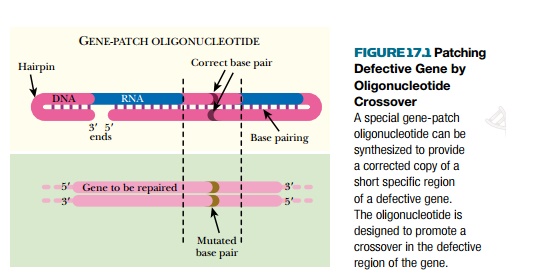Chapter: Biotechnology Applying the Genetic Revolution: Gene Therapy
Gene Patching by Oligonucleotide Crossover
GENE PATCHING BY OLIGONUCLEOTIDE CROSSOVER
During replacement gene
therapy, we normally think of replacing the whole defective gene with a
complete functional copy. However, some genetic defects consist of just a
single base change, or perhaps a cluster of closely linked base alterations. In
this case, the defective gene could be “patched” rather than replaced. This may
be done by crossing over with a relatively short double-stranded
oligonucleotide, which carries the wild-type sequence (Fig. 17.1).

The crossover frequency may
be improved by using an RNA-DNA hybrid oligonucleotide. Such hybrids are known
to take part in crossover formation more readily than double-stranded DNA. In
addition, designing hairpin bends protects the ends of the oligonucleotide and
prevents degradation by exonucleases. This technique is still in the
experimental phase.
Related Topics